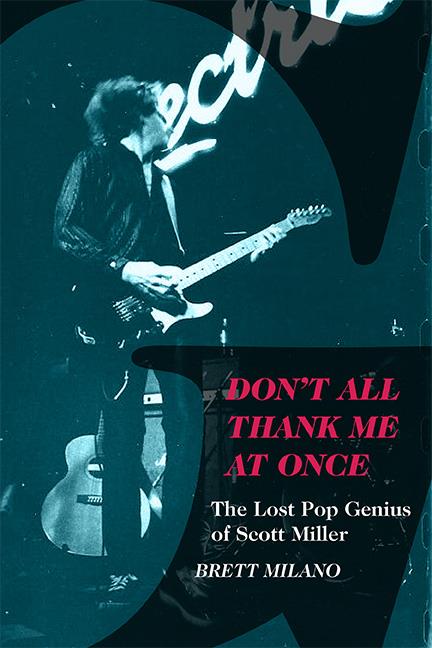Rediscovering A Cult Legend: A New Book Pays Tribute to Late Pop Genius Scott Miller
This post originally appeared on Vanyaland.

Game Theory / Courtesy photo by Robert Toren
It has been said that in the ’80s and ’90s, the late Scott Miller, the songwriter behind lost underground pop-rock bands Game Theory and the Loud Family, made some of the best music you have never heard.
Veteran Boston music writer Brett Milano hopes to rectify all that with his new book, Don’t All Thank Me At Once: The Lost Pop Genius of Scott Miller, published late last year via San Francisco’s 125 Records.
Though officially released online back in October, Milano’s latest effort—the follow-up to 2007’s ode to our city’s music scene, Sound of Our Town: A History of Boston Rock & Roll—gets the proper release party treatment this March 3 at Store 54 in Allston.
The night will feature a reading by Milano, as well as performances from John Powhida, Scott Janovitz, and former Curious Ritual members Linda Jung and Sean O’Brien, playing the music of Miller. In advance of the party, and as much of Game Theory and the Loud Family’s albums receive the reissue treatment, unearthing recordings that were long out of print, Vanyaland caught up with Milano to discuss Miller’s cult-hero status, his death in 2013, and how a songwriter often compared to the likes of Brian Wilson and Alex Chilton flew under the radar for so long—and if the internet will soon change all that.
Off the top—what led you to write a book about Scott Miller?
Like a lot of people I was pretty shaken up by his sudden and self-inflicted death in 2013, and thought he should be honored in some way. He always figured pretty high in my musical world and I knew him fairly casually and liked him. For me it goes back to 1991 when I was living in Los Angeles and he started sending me demos for the album that became Plants & Birds & Rocks & Things. I spent a year just listening to those songs constantly, I thought it was some of the best songwriting I’d ever heard. I helped arrange for the album to come out on Alias, and got a big thanks on the back cover… so I guess I have the distinction of being thanked personally on one of my all-time favorite albums!
So doing the book made me feel the same way I felt when I had these demos—that there’s some earthshaking music here that I have to tell people about. And it helped that there are a lot of interesting and genuinely nice people in Scott’s orbit who helped me get this done.
Miller is still pretty unknown in many music circles; why do you think this is? Was it his own doing? That’s a loaded question…
Somewhat, sure. He was a classic introvert in a lot of ways—very friendly if you said hello at a gig, but as his bandmates point out, he really hated the process of promoting himself. In some ways he had that sterotypical computer-genius personality; the name Spock cane up in these interviews more than once. Karen Glauber asks in the book if he could “make the girls in the back of the hall fall in love with him”, like Michael Stipe did. I think he could have but wasn’t sure if he wanted to.
Though he achieved cult status, why do you think Miller skated under the mainstream radar for so long?
Kind of a deadly combination of bad luck, not having an aggressive enough label, and being just slightly out of step with the times. If you got the term “power pop” hung on you in the ‘90s and your name wasn’t Matthew Sweet, it was pretty much over. And yet… take an album like the Loud Family’s Plants & Birds & Rocks & Things (his best, I think) and all the profound alienation that people heard in Nevermind was right there.
I read that most of his bands’ CDs went out of print for years. Do you think the internet can spike renewed interest in his works?
That’s actually starting to happen now. The Omnivore label is reissuing the Game Theory catalogue one by one; last month they got up to the double album Lolita Nation (which was the one everybody wanted but couldn’t find) and it’s being raved about everywhere—All Music Guide called it a masterpiece. I truly think he’s going to be rediscovered the way Big Star were.
How did he influence power-pop and other genres? At what point, if any, could you really hear Game Theory/Loud Family?
You can hear it in some bands who write cerebral, angular pop songs. New Pornographers come to mind immediately, and their leader Karl Newman is a fan. Another big fan was Aimee Mann who wrote a few unreleased songs with Scott. In fact she and her current musical partner Ted Leo initially bonded over their admiration for Scott. His widow Kristine is currently putting together an album with people fleshing out Scott’s unfinished demos, Peter Buck and the Posies will be involved in that.
Your last book, Sound Of Our Town, was about the Boston music scene. Did you want to deliberately branch out from that?
Yeah, there probably wasn’t much left to say about Boston rock history after Sound of Our Town. In truth I read a lot of rock bios and always wanted to have a stab at getting inside someone’s life story, trying to get a handle on how they accomplished what they did. Holly George Warren’s book on Alex Chilton was a big inspiration in that regard, and I was honored to have her blurb this book. And it makes some kind of poetic sense, since Scott really loved Chilton himself.
Does Miller have any ties to Boston? Were there any memorable shows in the ’80s or ’90s?
He played here on every tour, and there’s a story in the book about the year when Game Theory won a CMJ Award for best new artist. They’d played Boston the night before and discovered that he and Thalia Zedek played the same guitar. Only trouble was that he took Thalia’s to NYC by mistake, so the band had to zigzag back to Boston.
I first saw Game Theory at the Rat in 1988 a double bill with the Cavedogs, I think, and it was pretty packed. Game Theory made the mistake of not playing Billy Ruane’s favorite song of theirs, so Billy commandeered the stage at the end of their set to make sure this was rectified.
What do you hope to achieve with the book?
I’d honestly like Scott to get the kind of after-the-fact acclaim that Nick Drake and Gram Parsons did. Maybe someone who directs TV commercials will pick up the book and use one of his songs!
How’d you end up enlisting John Powhida for the book release party? And why did you decide to do it at Store 54? (I’m sensing there is an awesome Wayne Valdez story here, but maybe not…
John’s actually been a fan for a while. If you know the song of his, “Fall in Love Fast”, he quotes Scott’s line “He do the police in different voices”—which Scott in turn borrowed from T.S. Eliot! So he was right on top of my hit list. I should say that Linda Jung and Sean O’Brien, ex-Curious Ritual, with be playing too, for the first time since the Pipeline shows—they also were fans. No big stories on Wayne I’m afraid, it’s at Store 54 because I like the place and Wayne was good enough to let us use the room. Seemed more fitting to do this in a funky performance space than a bookstore.
Don’t All Thank Me At Once: The Lost Pop Genius of Scott Miller, by Brett Milano [book release party] with John Powhida + Linda Jung + Sean O’Brien: free, March 3, 8 p.m., Store 54, 16 Harvard Ave., Allston. Event info at Facebook, Amazon book page.



